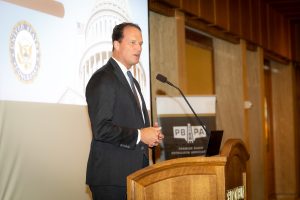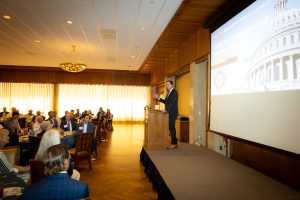
Congressman August Pfluger (TX-11) speaks during a Permian Basin Petroleum Association luncheon June 27, 2023 at the Petroleum Club in Midland.
Photo Credit: The Oilfield Photographer, Inc.
“PBPA is having a national impact.” Such was the message from Congressman August Pfluger to members of the Permian Basin Petroleum Association on June 27. The event fetched good attendance for a rare mid-summer luncheon.
Congressman Pfluger, who represents U.S. Congressional District 11, the 20-county district that includes the Midland/Odessa area, delivered the luncheon keynote address at a membership luncheon at Midland’s Petroleum Club. He holds the seat formerly held by Mike Conaway. Pfluger represents 20 counties in Texas, including Midland, Odessa, San Angelo, Killeen, Brownwood, and Llano. He grew up in San Angelo and served twenty years as a decorated fighter pilot, later as an advisor on the National Security Council, and still serves as a Colonel in the Air Force Reserves. In Congress, Rep. Pfluger is the first Member to represent Midland and Odessa on the Energy and Commerce Committee. He also serves on the House Committee on Homeland Security and co-founded the MACH 1 Caucus and the Texas Ag Task Force.
Rep. Pfluger covered a number of important issues at the federal level, including updates on legislative and regulatory priorities. We share some selected remarks.
On Making an Impact
Said Pfluger: “You [PBPA] are making a national impact on the direction that this country needs to go. We had two congressional hearings that came to the Permian Basin earlier this year, late February. And with the help of your leadership with Ben and Stephen right there, helping us select witnesses and go through the process of what needed to be said to the members of Congress everywhere across the country, both Republicans and Democrats by the way, that hearing led the way to the passage of the speaker’s priority legislation, H.R.1, House Resolution 1, the most important priority for Speaker McCarthy, this conference, which was energy security. And so, thank you for inviting me to speak with you today. I feel right at home because this is my passion. I think this is why I was sent to Washington D.C.”

Congressman August Pfluger (TX-11) speaks during a Permian Basin Petroleum Association luncheon June 27, 2023 at the Petroleum Club in Midland.
Photo Credit: The Oilfield Photographer, Inc.
Permian Energy Equals National Security
“From a national security standpoint, the challenges that we face right now are more serious than at any other point in our modern history. And I think even more serious than what we saw in World War II. More complex. There are different domains that you can fight in. It’s no longer just the air domain or the land domain or the sea. You have the cyber domain, you have space, you have non-traditional actors, you have non-state actors… These are the kinds of challenges that we face.
“And when I go to Washington and I talk about the underpinnings of our national security, I’m so proud to represent this district because this district is literally at the heart and soul of our national security. Rewind the clock to World War II—and I realize I’m preaching to the choir here—at least 25 percent of the world’s production came out of the Permian Basin during World War II. The German war machine ran out of POL—Petroleum, Oil, and Lubricants. They ran out of POL and they couldn’t continue their war efforts. We however, had the Permian Basin and we continued to produce, and that production of oil and gas in World War II allowed us to continue to build the actual weapon systems, the airplanes and the tanks and the armored vehicles to fight in two different theaters. Right now, I think we’re looking at a security challenge across the world, whether it’s the invasion of Ukraine or the threat of China and Xi Jinping invading Taiwan. We’re looking at a situation where the only answer from the United States of America has to be extreme strength. And that strength comes from our economy. It comes from having a military that is ready to fight. It comes from having the ability to have relationships and partnerships and alliances around the world where our partners and allies actually trust us and they know that we’re going to do what we say and likewise.
But all of those are a result of having energy. None of those things happen without energy. Not a single one of them. The military and that F-22 that I flew, it doesn’t—by the way, my carbon footprint was extremely high [laughter]—but that doesn’t happen without energy. Affordable, reliable energy…. Every single country I’ve gone to since being a member of Congress, including Japan, countries in Europe, all over the world, have asked, ‘Can we get more natural gas from West Texas?’ And I’ve said, ‘Yes, you can.’ But this Administration has declared war on this industry. It’s a shame. It’s under the auspices of this emergency that they have declared in the name of climate change.”

Congressman August Pfluger (TX-11) speaks during a Permian Basin Petroleum Association luncheon June 27, 2023 at the Petroleum Club in Midland.
Photo Credit: The Oilfield Photographer, Inc.
Know Who is Your Friend, and Who is Not
We have a lot of work to do. I am declaring war on entities like the EPA because they don’t have the best interest of our country at heart. They’re not actually helping the environment. They’re certainly not helping the most vulnerable in our country. They’re making energy more expensive for them. And they’ve used every weapon and every tool at their disposal. Endangered species, Waters of the U.S., the threat of an [ozone] non-attainment re-designation here, the tailpipe emission rule and a carve-out for California. All these things are currently happening. And this is what PBPA has helped with. When I say ‘help,’ let me give you the most important victory that we have had so far. When the Congressional hearing came to Midland, Texas, what we heard, 25 of us, Democrats and Republicans alike, what we heard is one of the most important priorities. If we could do one thing, what would it be? And it was NEPA [National Environmental Policy Act] reform. That was the one thing, that’s not everything, but that was the most important thing.”

Congressman August Pfluger (TX-11) speaks during a Permian Basin Petroleum Association luncheon June 27, 2023 at the Petroleum Club in Midland.
Photo Credit: The Oilfield Photographer, Inc.
“In the debt ceiling deal, the Speaker of the House, having already passed H.R.1, which was the Lowering Energy Cost for America Act… had a host of other things that gave the speaker the ability to go to the White House and negotiate NEPA reform the first time in 40 years. It’s not everything, but let me tell you what it actually does. And this is a solid first down. I figured in Midland, definitely in Odessa, this is a safe analogy. As a [San Angelo] Central Bobcat having come over here many times [where] we’ve gotten beaten… [laughter] I know about that.
Timeliness—Incredibly Important
“NEPA reform is a piece of the puzzle… that was taking 6, 7, 8, almost 10 years to do. So when the Speaker of the House went to the White House, we nicked it down to where you have two total years to write the actual statement and one year to do the environmental review. No longer will you have to deal with 10 agencies.You get one agency, a lead coordinating agency to work with. No longer do you have to write 700, 800 pages, but now you can limit that. And the timeliness of this is incredibly important.
“This is a major first down for us. The Administration has said time and time again that they will do nothing on oil and gas. They will do nothing to further it. And yet here we are not having control of two of the three and we’re able to get this done. And so, I want to tell you that the work that was done ahead of time by a very, very slim majority of five seats out there to get to the point, and this is where PBPA played a major role in helping with these talking points and helping with the narrative and getting this across the finish line. Thank you for the work that was done to allow us to get this into a negotiation and actually get it signed into law.”

Congressman August Pfluger (TX-11) speaks during a Permian Basin Petroleum Association luncheon June 27, 2023 at the Petroleum Club in Midland.
Photo Credit: The Oilfield Photographer, Inc.
PBPA’s event organizers commented, saying: “PBPA continues to work hard to be the best advocate we can be in Washington, D.C., but sometimes the best way to do that is to bring Washington, D.C. to our members! We greatly appreciate Rep. Pfluger’s service and wisdom and look forward to continuing to work with him to ensure that the Permian Basin remains the greatest place to live, work, and raise a family. Special thanks to Ovintiv and Fasken Oil and Ranch for their sponsorship of the event.”
For the complete transcript of Congressman’s Pfluger’s remarks:
https://pboilandgasmagazine.com/the-permian-basin-and-national-security/









